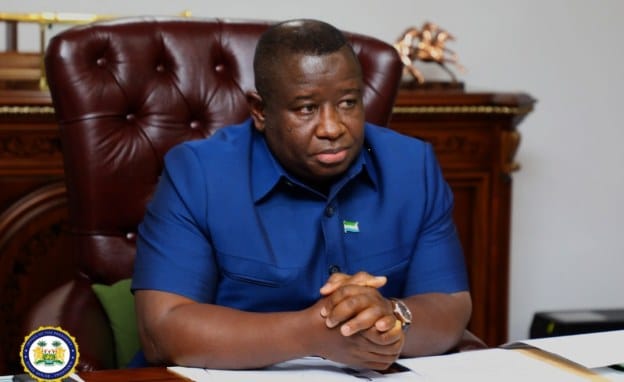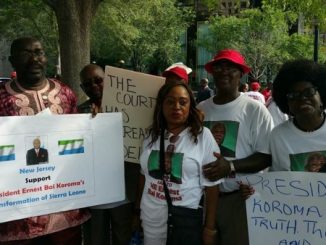
Poverty, unemployment, hunger, inflation, poor infrastructure, poor management of the country’s natural resources, corruption, injustice, inequality, and oppression are some of the driving forces we identified as reasons for the rising unhappiness among Sierra Leoneans. Below are detailed explanations of some of the reasons highlighted:
Poverty
Sierra Leone remains the most unhappy country in the region, as it struggles with poverty levels. In 2021, approximately 6.1 million people were living below the international poverty line.
People in Sierra Leone have experienced multiple adverse events in the past, combined with current struggles to maintain well-being in terms of economic development, health, and education. Sierra Leone was ranked 181 out of 189 on the Human Development Index in 2019 (United Nations Development Programme.)
Unemployment and lack of opportunities
Almost 65 percent of Sierra Leone’s youthful population is unemployed, driving their urge to seek work abroad, usually via volatile migration routes. In a recent study, Sierra Leone was ranked as the No. 1 country in the world where its citizens want to migrate from and search for better opportunities elsewhere.
“If you randomly ask people strolling in the streets, 90 out of 100 will choose to migrate to Europe or the US if they find an opportunity,” argues Alpha Bendu, a school teacher in Freetown.
Unemployment, especially in youth, was said to lead to emotional distress and frustration and in some cases criminal behavior and lawlessness.
“Because there are no jobs, these young boys are idle and it leads to many problems.
Young people, especially those who have skills and qualifications are wallowing in unemployment.
“Most young people find it difficult to get a job after graduating from college or after learning a skilled job
Hunger
As the saying goes, a hungry man is an angry man. WFP’s Hunger Map for Sierra Leone shows that 2.2 million people out of a 7 million population are chronically hungry, and 1.6 million people are acutely hungry as of July 15, 2022.
In addition to a lack of money to buy food and other essentials, in some areas, there were also inadequate food supplies even for those who did have money. This was because farming was poor in some parts of the country, and others referred to food shortages at particular times of year (the dry season).
The number of people facing severe hunger in the country has tripled in the last decade and food insecurity has deepened at the same time the prices of rice and cassava have quadrupled, a recent study by WFP revealed.
Inflation
The cost of food and non-food commodities, including fuel and building materials, was said to be increasing and this limited the amount of food families were able to buy with their limited income. The increased cost of fuel also had an impact on the availability and cost of public transport. The cost of farm equipment (tools and fertilizer) was said to hinder crop production, which again had an impact on the availability and cost of food.
“Prices for major food items — rice, cooking oil, onion, sugar, and flour — have quadrupled,” Kargbo told AFP. “We were buying a cup of rice for 1,500 leones ($0.08) in 2021 –- now its 3,500 leones,” she added.
Poor Infrastructure
Insufficient water for the population, lack of toilets, lack of electricity, housing problems, transportation constraints, poor road networks, lack of access to good health care, and poor road networks are some of the infrastructure challenges that are contributing to the unhappiness of the majority of Sierra Leoneans.
In some communities, there were either no pipe-borne water taps (so people had to use river water or walk long distances) or insufficient water for the population. The situation was especially difficult during the dry season when water sources might dry up. This resulted in people drinking unclean water, going long distances to fetch water, and/ or paying for water.
Most households, especially in Freetown, did not tend to have toilets. They shared and there was a lack of public toilets. Many residents said that the toilets in their community were broken or full because of the number of people using them. The consequence of this was that people went to the bush to defecate, contributing to sickness within the surrounding communities.
Lack of electricity is a constant concern for citizens, with some raising concerns about the effect of this on business and the development of their community.
Problems related to housing are also affecting the mental state of Sierra Leoneans. Some citizens highlighted the high cost of rent, connected to the lack of income-generating opportunities but the issue mentioned most often was the poor condition of housing which led to health problems.
A lack of access to good healthcare was of concern to men and women across the country. For some cost was said to be the main barrier to accessing healthcare, even for services that should be free. Some citizens are concerned with the lack of health facilities within the local area where they lived, meaning that they had to travel some distance to access the care they needed. This had implications in terms of the cost of transport, and the time taken to reach a healthcare facility in case of emergencies.
The poor road networks contributed to poverty since the cost of food to be transported into the area was higher, and public transport costs were also higher. In some areas, there were limited public transport vehicles, which was attributed in part to the poor state of the roads. Poorly maintained roads were said to contribute to health problems, as the risk of accidents increased and the dust from the roads caused respiratory problems.
Poor Management of Natural Resources
Sierra Leoneans are unhappy with the handling of the country’s natural resources by the authorities. Despite being one of the few countries in the world that has precious natural resources such as diamonds and rare minerals, this nation continues to suffer from extreme poverty.
The diamond industry, one of the main sources of revenue for the Sierra Leonean government, has brought significant income to the country, but the top-down effect is virtually non-existent; lower-class and rural citizens still experience exploitative labor relations and persistent poverty within mining communities. They do not see the money that they worked so hard to bring in, and are still impoverished because the government mismanages the funds.
Corruption
One of the most basic factors causing poverty and unhappiness within Sierra Leone lies within the government. Since colonial rule departed, the government has been characterized primarily by either a one-party rule or a military rule, a one-dimensional rule that does not allow for opposition and breeds corruption. The government has been extremely incompetent in providing its citizens with the most basic needs because these needs have been usurped by nongovernment officials themselves. As one writer aptly put it, “Sierra Leoneans were not just neglected, uninvolved, or would catch up later in the nation’s development. They were actively exploited or ‘ripped off’, and had been for roughly a hundred years – first by colonialism and then by the policies, plans, and programs of the government of independent Sierra Leone.”
Injustice, Inequality, Oppression
People are happy when they have secure jobs and a regular flow of income. They are happy to see justice being meted out to the guilty. In Sierra Leone, every day we are witnessing unjust rulings being delivered against innocent individuals by the Court, while the guilty walk away scot-free. When people like former Bank Governor, Professor Kelfala Kallon escaped abroad after ravaging the country’s economy to the ground, ordinary people felt very unhappy and angry.
Growing inequality and seeing the rich and famous having fancy weddings and lavish parties at home and abroad do make ordinary people unhappy. In contrast, the Scandinavian countries and Holland are very egalitarian in comparison and there are not many people whose lifestyles are in stark contrast to the lifestyles of people around them.
Oppression and marginalization of individuals, both within and outside of tribal groups, have also led to persistent emotional distress among Sierra Leoneans.
Many Sierra Leoneans get less than minimum wage for the amount of manual labor that they perform; it is often not enough for the workers and their families to subsist on. In economic terms, they earn low rates of return on their earnings because they are unable to save any surplus of money after meeting their immediate needs, which are expensive and take up much of their modest paycheck.
Courtesy
“`NCUP-BOMBALI-SIERRA LEONE🇸🇱🇸🇱🇸🇱🇸🇱
AN AFFILIATE BODY TO THE ALL PEOPLE CONGRESS🚩🚩🚩🚩 *“`
*SIERRA LEONE WILL BE A DEAD ZONE IF MADDA BIO IS GIVEN A SECOND CHANCE* 🔥🔥🔥😭😭😭😭😭😭😭😭😭😭😭
*NCUP MEDIA BOMBALI BRANCH*
*🖊️Son of the Soil🚩* 🇸🇱




